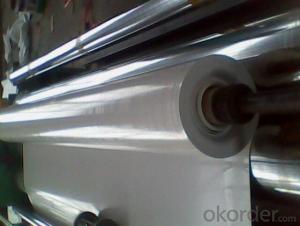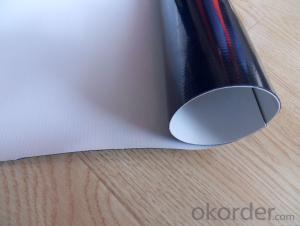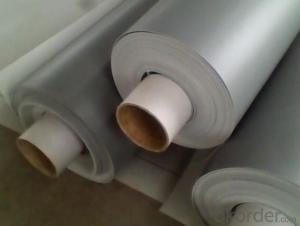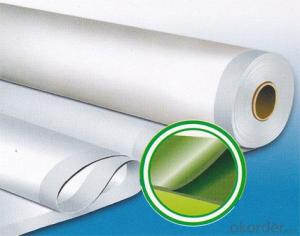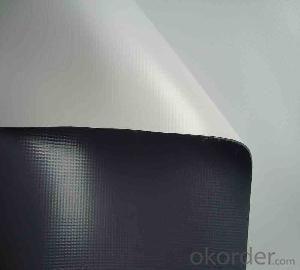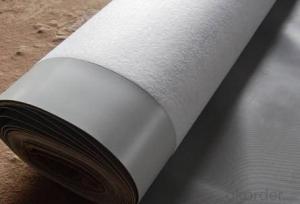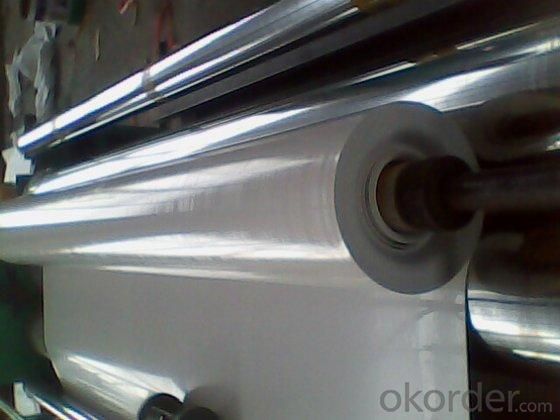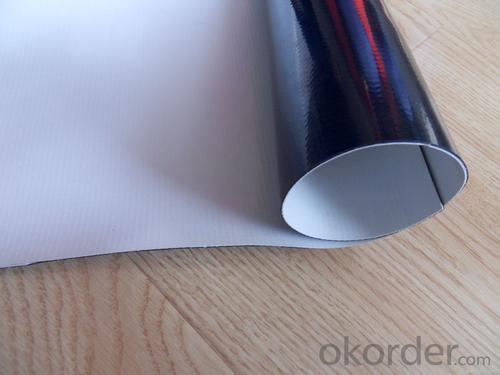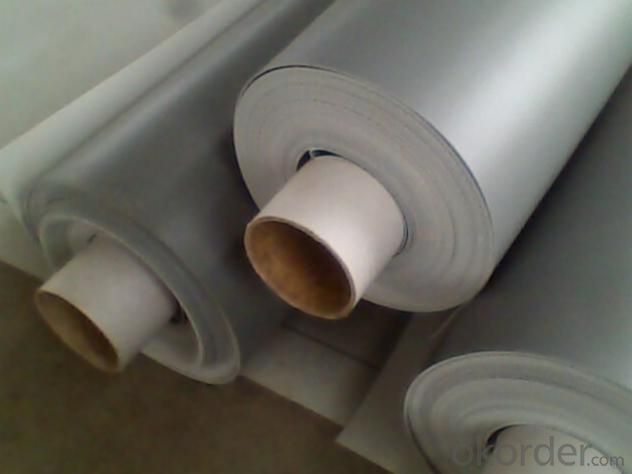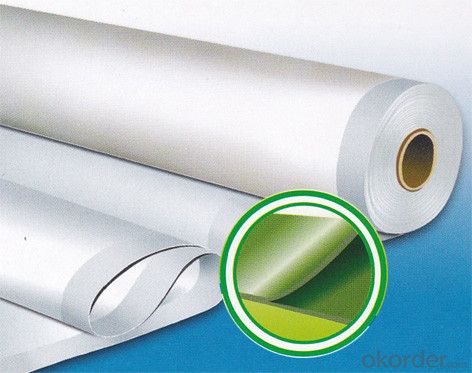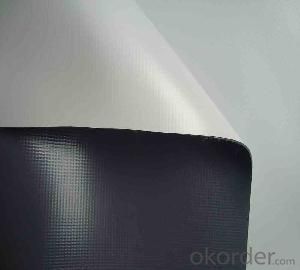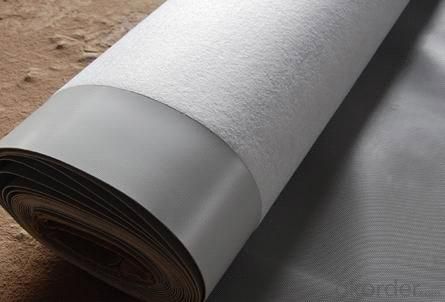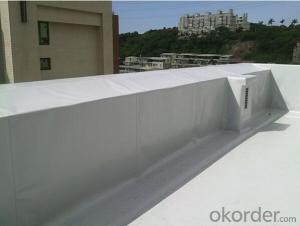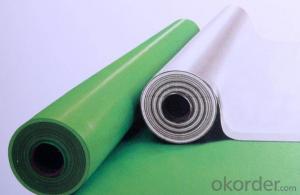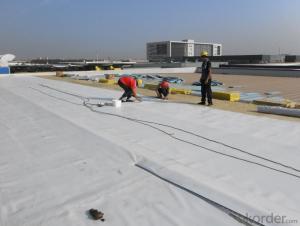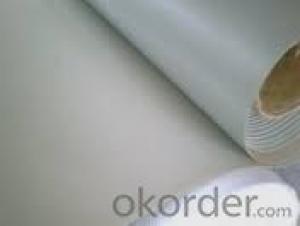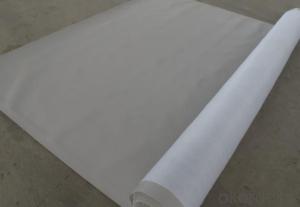PVC Waterproof Membrane in 1.2mm Thickness
- Loading Port:
- Shanghai
- Payment Terms:
- TT OR LC
- Min Order Qty:
- 20000 m²
- Supply Capability:
- 5000000 m²/month
OKorder Service Pledge
OKorder Financial Service
You Might Also Like
PVC Waterproof Membrane in 1.2mm Thickness
Product Description of PVC Waterproof Membrane in 1.2mm Thickness:
PVC Membrane Waterproof /Waterproofing membrane For Roof is a new polymer waterproof membrane. The PVC Membrane Waterproof /Waterproofing membrane For Roof raw material is polyvinyl chloride resin, mixed with plasticizer, filler, antioxygen, ultraviolet absorber and other auxiliaries.
Thickness: 1.2mm/1.5mm/1.8mm/2.0mm
Width:2050mm
Length:20m( Special specifications can be customized)
Size: 2.05mx20m
Color: white/grey, or any other colors.
Features of PVC Waterproof Membrane in 1.2mm Thickness:
1. Excellent aging resistance. Service life of roofing material is over 20 years; service life of underground material is over 50 years.
2. Root resistant penetration, specially used on planting roofings.
3. Welding installation. Joints are solid and environment friendly, no pollution.
4. High tensile strength, good elongation and dimensional stability.
5. Good plasticity, easy and suitable for details installation.
6. Fireproof. Fire extinguished out of the ignition resource.
7. Surface is smooth, no fading and dirty resistant.
8. Width is over 2m. Construction wastage is small, more economical.
Classification of PVC Waterproof Membrane in 1.2mm Thickness:
1. N: Homogeneous PVC membrane
2. L: PVC membrane with fabric backing
3. W: Reinforced PVC membrane
Advantage of PVC Waterproof Membrane in 1.2mm Thickness:
1.) Mixing automation. Apply automatic temperature control automatic time control and automatic feed control.
2.) Extrusion equipment uses twin screw coextrusion. Screw temperature uses computer automatic temperature control system.
3.) Handpiece uses large width didhead extrusion equipment.
4.) Sophisticated three-roller calender equipment. The space between equiment is controlled by automation system.
Technical Data of PVC Waterproof Membrane in 1.2mm Thickness:
No. | Item | Model Ⅱ | |
1 | Tensile Strength Mpa ≥ | 12.0 | |
2 | Elongation at break% ≥ | 250 | |
3 | Shrinkage rate % ≤ | 2.0 | |
4 | Flexibility at low temperature | No crackle at -25oC | |
5 | Water tightness | Watertight | |
6 | Puncture resistance | Watertight | |
7 | Heat aging treatment | Appearance | Free from bubble, crack, cohesion and void |
Change rate of tensile strength % | +20oC | ||
Change rate of elongation at break | |||
Flexibility at low temperature | No crack at -20oC | ||
8 | Chemical corrosion resistance | Change rate of tensile strength % | +20 |
Change rate of elongation at break | |||
Flexibility at low temperature | No crack at -20oC | ||
9 | Artificial weathering | Change rate of tensile strength % | +20 |
Change rate of elongation at break | |||
Flexibility at low temperature | No crack at -20oC | ||
Application of PVC Waterproof Membrane in 1.2mm Thickness:
PVC waterproof membrane forms an effective barrier to liquid water or water vapor in the steel structure for industrial and civil engineering, underground engineering, such as subway, bridges , tunnel, water pools, shelter, grain depot, land filling and subwayProducts display.
Images of PVC Waterproof Membrane in 1.2mm Thickness:
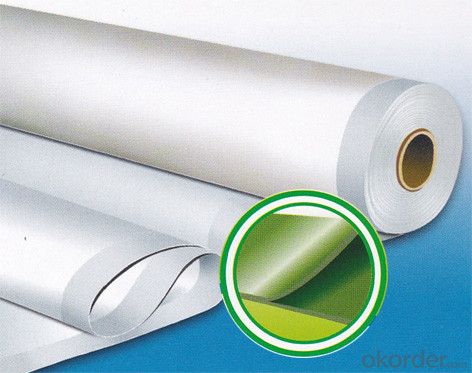
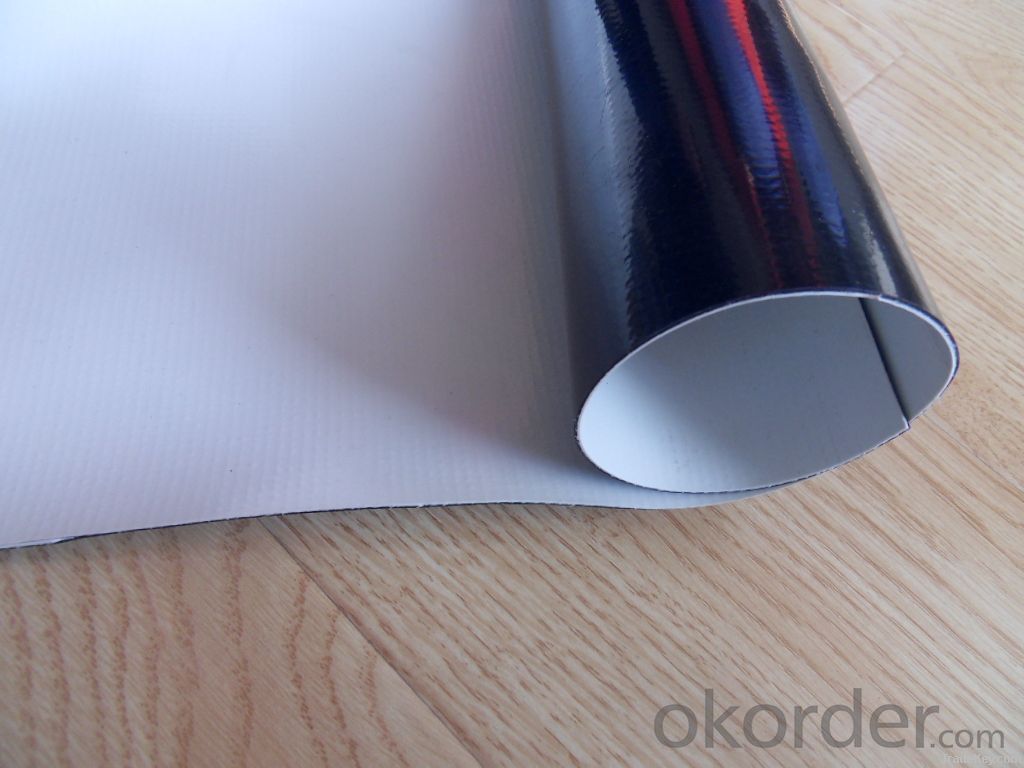
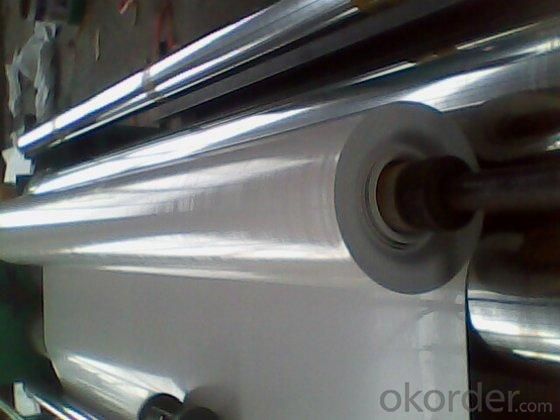
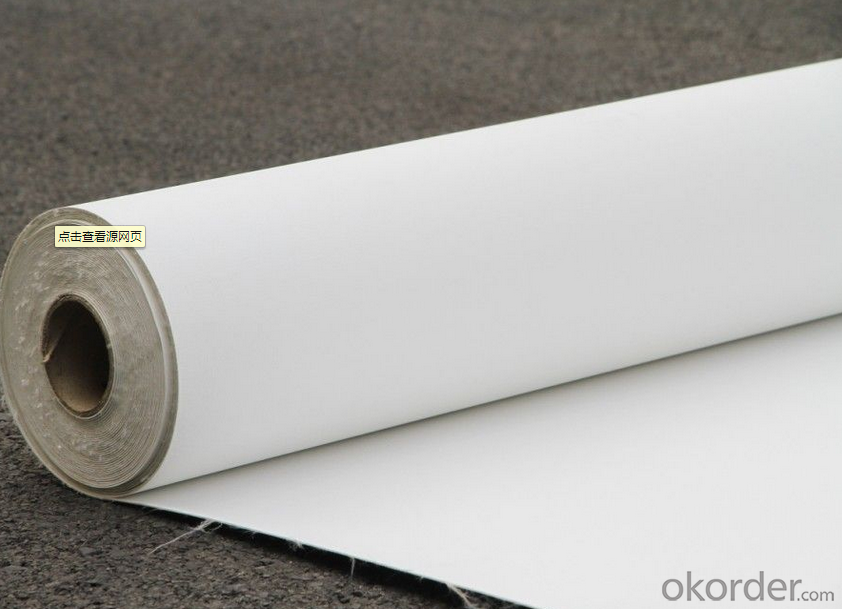
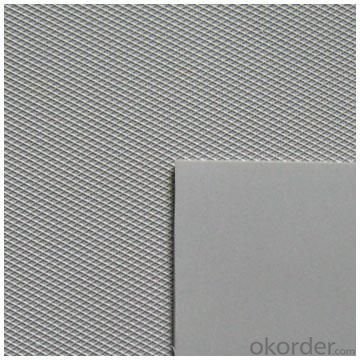
FAQ:
1. Can you produce 4m width?
Yes, no problem for us. We have four bases in China, largest one in this field.
2. How many quantity in one 20'' container for 1.2mm and 1.5mm?
480rolls, 11520m2 for 1.2mm and 400rolls, 9600m2 for 1.5mm
3. Can you provide free samples?
Yes, our samples are free, but express fees usually on buyer's account.
- Q: Can a waterproofing membrane be used for solar panel installations?
- Indeed, the utilization of a waterproofing membrane in solar panel installations is not only possible but highly recommended. It is common practice to incorporate a waterproofing membrane into the installation process in order to safeguard the roof or other surfaces beneath the solar panels from water-related harm. The primary function of a waterproofing membrane is to serve as a barrier, preventing water infiltration into the underlying structure. This, in turn, ensures the integrity and security of the solar panel installation, which is of utmost significance considering their typical placement on rooftops, where they are exposed to various weather conditions. By incorporating a waterproofing membrane, the longevity of the solar panels is prolonged, and any potential issues arising from water are effectively mitigated, thus preserving their optimal performance.
- Q: Are there any specific installation requirements for waterproofing membranes?
- Waterproofing membranes have specific installation requirements that vary depending on the type of membrane. However, there are some general guidelines that apply to most installations. To begin, it is crucial to adequately prepare the surface where the membrane will be applied. This involves cleaning the surface, removing any loose debris or previous coatings, and ensuring it is smooth and free from irregularities. Proper surface preparation allows for better adhesion between the membrane and the surface. Following that, the membrane should be applied in accordance with the manufacturer's instructions. This typically involves using a suitable adhesive or bonding agent to attach the membrane to the surface. It is important to adhere to the recommended application rate and ensure a uniform application without air bubbles or wrinkles. In addition to correct application, special attention should be given to the seams and joints of the membrane. These areas are particularly vulnerable to water penetration, so they need to be carefully sealed using an appropriate sealant or tape. This guarantees a watertight seal and prevents any water from seeping through the seams. Lastly, it is essential to safeguard the installed membrane from damage during and after installation. This can be achieved by covering the membrane with a protective layer, such as geotextile fabric or a layer of soil, to prevent punctures or tears. Additionally, any construction or landscaping work following the installation should be done cautiously to avoid harming the membrane. Ultimately, the specific installation requirements for waterproofing membranes depend on the type of membrane and the project's specific conditions. It is always advisable to consult the manufacturer's instructions and guidelines to ensure proper installation and long-lasting waterproofing performance.
- Q: Can a waterproofing membrane be used in chemical or hazardous environments?
- Yes, a waterproofing membrane can be used in chemical or hazardous environments. Waterproofing membranes are designed to provide a barrier against water, moisture, and other liquids, which can also include chemicals and hazardous substances. These membranes are typically made of materials that are resistant to chemicals, such as polyurethane, PVC, or modified bitumen, to ensure they can withstand exposure to various chemicals without being damaged or compromised. However, it is important to select a waterproofing membrane specifically designed for chemical or hazardous environments to ensure it meets the necessary requirements and standards for such applications. Additionally, proper installation and maintenance are crucial to ensure the effectiveness and longevity of the waterproofing membrane in these environments.
- Q: Can a waterproofing membrane be used on metal surfaces?
- A waterproofing membrane is capable of being utilized on metal surfaces, providing protection against water infiltration. These membranes are specifically designed to safeguard various materials, including metal, from water damage. They are primarily composed of modified bitumen, EPDM, PVC, or TPO, which offer a resilient and impervious barrier. By applying a waterproofing membrane to a metal surface, one can effectively ward off corrosion, rust, and water-related harm. This makes it a suitable solution for shielding metal structures, roofs, or surfaces that are exposed to moisture or water. However, it is crucial to ensure that the chosen waterproofing membrane is compatible with the specific type of metal surface and that proper installation guidelines are adhered to in order to achieve optimal performance and durability.
- Q: Can a waterproofing membrane be used for planters or raised beds?
- Yes, a waterproofing membrane can be used for planters or raised beds to prevent water leakage and protect the surrounding areas from potential damage.
- Q: Can a waterproofing membrane be used in kitchens?
- Yes, a waterproofing membrane can be used in kitchens. In fact, it is highly recommended to use waterproofing membranes in areas prone to moisture and water exposure, such as kitchens. These membranes are designed to create a barrier against water and prevent it from seeping into the underlying structure, protecting it from damage. They are commonly used on floors, walls, and even countertops to ensure a watertight seal and prevent water damage, mold growth, and other issues. Additionally, waterproofing membranes can also help with soundproofing and provide added durability and longevity to the kitchen surfaces.
- Q: Can a waterproofing membrane be used for bridges or parking decks?
- Yes, a waterproofing membrane can be used for bridges or parking decks. Waterproofing membranes are specifically designed to protect structures from water damage and are commonly used in construction projects for this purpose. Bridges and parking decks are exposed to various weather conditions, including rain, snow, and ice, which can lead to the deterioration of the concrete and steel components. By applying a waterproofing membrane, the structure is protected from the ingress of moisture, preventing corrosion, cracking, and other forms of deterioration. Additionally, waterproofing membranes can also provide additional benefits such as improved durability, increased lifespan, and reduced maintenance costs for these structures. Therefore, using a waterproofing membrane is a recommended solution to ensure the long-term integrity and functionality of bridges and parking decks.
- Q: Are waterproofing membranes resistant to acid rain?
- Yes, waterproofing membranes are generally resistant to acid rain due to their ability to protect against water penetration and chemical exposure.
- Q: Can a waterproofing membrane be used for water treatment plants?
- Indeed, water treatment plants can benefit from the utilization of waterproofing membranes. These specialized membranes are specifically engineered to impede the flow of water, making them an ideal solution for safeguarding against water seepage in diverse structures, including water treatment plants. By applying these membranes to various sections of the facility, such as tanks, reservoirs, pipes, and basements, infiltration of water can be effectively prevented, thus shielding the infrastructure from potential harm. Furthermore, the implementation of waterproofing membranes aids in preserving the integrity of the water treatment process by ensuring that water remains confined within designated areas and does not permeate the surrounding soil or structures.
- Q: SBS waterproofing membrane sub-class I and II when to use what level to use a secondary level
- For the PE film (aluminum), color sand, shale, fine sand and other four categories; width: 1000mm, 10m long, 15m two specifications; thickness: polyester felt coil 3mm, 4mm, 5mm; fiberglass membrane 3mm, 4mm; glass fiber reinforced polyester felt 5mm Scope: Widely used in industrial and civil construction of the roof, basement, bathroom and other waterproofing works and roof gardens, roads, bridges, tunnels, parking lots, swimming pools and other projects waterproof and moisture. Deformation of the larger project recommended the use of excellent extension of the polyester tire products, other buildings should choose a relatively economical glass fiber products. So look at the temperature and then choose.
Send your message to us
PVC Waterproof Membrane in 1.2mm Thickness
- Loading Port:
- Shanghai
- Payment Terms:
- TT OR LC
- Min Order Qty:
- 20000 m²
- Supply Capability:
- 5000000 m²/month
OKorder Service Pledge
OKorder Financial Service
Similar products
Hot products
Hot Searches
Related keywords
